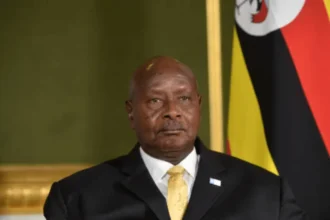Following the forcible dismissal of Momodou Ceesay, the nation’s auditor general, as part of a contentious government reorganization spearheaded by President Adama Barrow, tensions have flared in The Gambia. After declining a new ministerial position, Ceesay, who had been in the position for almost three years, was forcefully removed from his position by the police.
The action has provoked strong opposition from anti-corruption activists, civil society organizations, and citizens. The measure, according to critics, jeopardizes transparency and erodes public confidence in the organizations responsible for financial supervision. Many view the reshuffle as politically driven, even though the administration claims it was based on qualifications.
For what reason was the auditor general dismissed?
Ceesay was recently offered a new position as commerce minister by President Barrow. According to reports, Ceesay turned down the offer and decided to stay in his auditing position. The president asserts, however, that he first agreed to the new role but then changed his mind. He was forcibly removed from office as a result of this argument. Here is the link to our article on the Khalil Government Lawsuit.
Who was chosen to succeed him?
Ceesay was replaced by Cherno Amadou Sowe, the former Director of Internal Audit. But despite internal opposition and public outcry, Sowe has yet to assume the role. In an era when public scrutiny of government finances is growing, this has left a void in the National Audit Office.
What happened during the removal?
Ceesay was escorted out of his office by plainclothes police. At first, his employees protested, which led to delays and public attention. Later, backup troops stepped in and took him away by force while he was giving a press conference. After that, he was led to his legal representative. Public indignation was stoked by the incident’s widespread social media sharing. Here is the link to our article on Government Backs Taliban.
How has the general public responded?
Activists and youth organizations have called for Ceesay to be reinstated. Some even threatened large-scale demonstrations in Banjul, the capital. Notably, after trying to speak to the media at the audit office, anti-corruption activists Kemo Fatty and Alieu Bah were taken into custody. The demands for openness and democratic accountability have increased as a result of their arrests.
What is the larger political backdrop?
The event comes after recent claims that assets belonging to former President Yahya Jammeh were transferred to people with ties to the current government. Many view the forced resignation of the auditor general as part of a larger attempt to restrict financial oversight in the face of mounting political pressure, even if President Barrow denies any wrongdoing.
The administration responded by issuing a statement restating its dedication to economic responsibility, good governance, and the rule of law. In order to avoid interfering with audit procedures, officials maintained that Ceesay’s ministerial offer was made in good faith and based on his qualifications.
Final Thoughts
A national dialogue over government accountability and the independence of oversight institutions has been sparked by the forcible expulsion of the auditor general of The Gambia. The government is under growing pressure to keep its reform pledges as public demand for transparency rises. Restoring confidence in democratic administration will depend on ensuring the independence of positions such as the auditor general.








